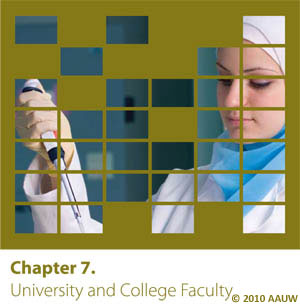


The Importance of Mentoring for College Faculty
 Laura has talked about mentoring in this forum before, and Cathy Trower of the Collaborative on Academic Careers in Higher Education (COACHE) project at Harvard University recommends that departments provide mentoring for all faculty to promote a better sense of fit and belonging. Mentoring appears to help address the feelings of isolation and marginalization that women in academic settings often report. Among science, technology, engineering, and mathematics (STEM) faculty in a recent COACHE survey, women rated the importance of formal mentoring significantly higher than men did. Trower told AAUW, "Mentoring is crucial for STEM women because without it, they might not be privy to the good old boys' club or behind-the-scenes conversations that are crucial to fitting in the department and to getting tenure."
Laura has talked about mentoring in this forum before, and Cathy Trower of the Collaborative on Academic Careers in Higher Education (COACHE) project at Harvard University recommends that departments provide mentoring for all faculty to promote a better sense of fit and belonging. Mentoring appears to help address the feelings of isolation and marginalization that women in academic settings often report. Among science, technology, engineering, and mathematics (STEM) faculty in a recent COACHE survey, women rated the importance of formal mentoring significantly higher than men did. Trower told AAUW, "Mentoring is crucial for STEM women because without it, they might not be privy to the good old boys' club or behind-the-scenes conversations that are crucial to fitting in the department and to getting tenure."
Interestingly, women rated the importance of informal mentoring even higher than that of formal mentoring. Trower believes that this may be because "informal relationships arise organically and because they are not part of a formal process, they may feel more natural, closer, more trusting, and honest, which may be especially important to women in STEM, who are often in a numerical minority in their departments."
Have you been part of a successful formal mentoring program or helped create opportunities for informal mentoring to happen?

I agree with you, Laura. It makes sense that informal mentoring would be more effective for the reasons you mention. I guess by its nature, though, it's hard to capture that effectiveness and create a program that's AS effective since then you've got formal mentoring!
Thanks for commenting,
Christi
Hi Chrisi,
I'd say that informal relationships are more likely to allow the mentor to comfortably reveal candid information about how an institution really does its business, so that the young faculty woman can seek effective strategies to work around the problem areas. An assigned mentor (assigned by the dean, typically, or by a high level faculty committee) is unlikely to develop a strong enough connection with the mentee for the older faculty member to feel it's OK to talk about these deep problems.
cheers,
Laura















